WTF Solidity: 13. Inheritance
Recently, I have been revisiting Solidity, consolidating the finer details, and writing "WTF Solidity" tutorials for newbies.
Twitter: @0xAA_Science | @WTFAcademy_
Community: Discord|Wechat|Website wtf.academy
Codes and tutorials are open source on GitHub: github.com/AmazingAng/WTFSolidity
In this section, we introduce inheritance in Solidity, including simple inheritance, multiple inheritance, and inheritance of modifiers and constructors.
Inheritance
Inheritance is one of the core concepts in object-oriented programming, which can significantly reduce code redundancy. It is a mechanism where you can to derive a class from another class for a hierarchy of classes that share a set of attributes and methods. In solidity, smart contracts can be viewed objects, which supports inheritance.
Rules
There are two important keywards for inheritance in Solidity:
virtual: If the functions in the parent contract are expected to be overridden in its child contracts, they should be declared asvirtual.override:If the functions in the child contract override the functions in its parent contract, they should be declared asoverride.
Note 1: If a function both overrides and is expected to be overridden, it should be labeled as virtual override.
Note 2: If a public state variable is labeled as override, its getter function will be overridden. For example:
mapping(address => uint256) public override balanceOf;
Simple inheritance
Let's start by writing a simple Grandfather contract, which contains 1 Log event and 3 functions: hip(), pop(), grandfather(), which outputs a string "Grandfather".
contract Grandfather {
event Log(string msg);
// Apply inheritance to the following 3 functions: hip(), pop(), man(),then log "Grandfather".
function hip() public virtual{
emit Log("Grandfather");
}
function pop() public virtual{
emit Log("Grandfather");
}
function Grandfather() public virtual {
emit Log("Grandfather");
}
}
Let's define another contract called Father, which inherits the Grandfather contract. The syntax for inheritance is contract Father is Grandfather, which is very intuitive. In the Father contract, we rewrote the functions hip() and pop() with the override keyword, changing their output to "Father". We also added a new function called father, which output a string "Father".
contract Father is Grandfather{
// Apply inheritance to the following 2 functions: hip() and pop(),then change the log value to "Father".
function hip() public virtual override{
emit Log("Father");
}
function pop() public virtual override{
emit Log("Father");
}
function father() public virtual{
emit Log("Father");
}
}
After deploying the contract, we can see that Father contract contains 4 functions. The outputs of hip() and pop() are successfully rewritten with output "Father", while the output of the inherited grandfather() function is still "Gatherfather".
Multiple inheritance
A solidity contract can inherit multiple contracts. The rules are:
For multiple inheritance, parent contracts should be ordered by seniority, from the highest to the lowest. For example:
contract Son is Gatherfather, Father. A error will be thrown if the order is not correct.If a function exists in multiple parent contracts, it must be overridden in the child contract, otherwise an error will occur.
When a function exists in multiple parent contracts, you need to put all parent contract names after the
overridekeyword. For example:override(Grandfather, Father).
Example:
contract Son is Grandfather, Father{
// Apply inheritance to the following 2 functions: hip() and pop(),then change the log value to "Son".
function hip() public virtual override(Grandfather, Father){
emit Log("Son");
}
function pop() public virtual override(Grandfather, Father) {
emit Log("Son");
}
After deploying the contract, we can see that we successfully rewrote the hip() and pop() functions in Son contract, changing the output to "Son". While the grandfather() and father() functions inherited from its parent contracts remain unchanged.
Inheritance of modifiers
Likewise, modifiers in Solidity can be inherited as well. Rules for modifier inheritance are similar as the function inheritance, using the virtual and override keywords.
contract Base1 {
modifier exactDividedBy2And3(uint _a) virtual {
require(_a % 2 == 0 && _a % 3 == 0);
_;
}
}
contract Identifier is Base1 {
// Calculate _dividend/2 and _dividend/3, but the _dividend must be a multiple of 2 and 3
function getExactDividedBy2And3(uint _dividend) public exactDividedBy2And3(_dividend) pure returns(uint, uint) {
return getExactDividedBy2And3WithoutModifier(_dividend);
}
// Calculate _dividend/2 and _dividend/3
function getExactDividedBy2And3WithoutModifier(uint _dividend) public pure returns(uint, uint){
uint div2 = _dividend / 2;
uint div3 = _dividend / 3;
return (div2, div3);
}
}
Identifier contract can directly use the exactDividedBy2And3 modifier, because it inherits Base1 contract. We can also rewrite the modifier in the contract:
modifier exactDividedBy2And3(uint _a) override {
_;
require(_a % 2 == 0 && _a % 3 == 0);
}
Inheritance of constructors
Constructors can also be inherited. Let first consider a parent contract A with a state variable a, which is initialized in its constructor:
// Applying inheritance to the constructor functions
abstract contract A {
uint public a;
constructor(uint _a) {
a = _a;
}
}
There are two ways for a child contract to inherit the constructor from its parent A:
Declare the parameters of the parent constructor at inheritance:
contract B is A(1){}Declare the parameter of the parent constructor in the constructor of the child contract:
contract C is A {
constructor(uint _c) A(_c * _c) {}
}
Calling the functions from the parent contracts
There are two ways for a child contract to call the functions of the parent contract:
Direct calling:The child contract can directly call the parent's function with
parentContractName.functionName(). For example:function callParent() public{
Grandfather.pop();
}superkeyword:The child contract can use thesuper.functionName()to call the function in the neareast parent contract in the inheritance hierarchy. Solidity inheritance are declared in a right-to-left order: forcontract Son is Grandfather, Father,Fathercontract is closer than theGrandfathercontract. Thus,super.pop()in theSoncontract will callFather.pop()but notGrandfather.pop().function callParentSuper() public{
// call the function one level higher up in the inheritance hierarchy
super.pop();
}
Diamond inheritance
In Object-Oriented Programming, the diamond inheritance refers the scenario that a derived class has two or more base classes.
When using the super keyword on a diamond inheritance chain, it should be noted that it will call the relevant function of each contract in the inheritance chain, not just the nearest parent contract.
First, we write a base contract called God. Then we write two contracts Adam and Eve inheriting from God contract. Lastly, we write another contract people inheriting from Adam and Eve. Each contract has two functions, foo() and bar():
// SPDX-License-Identifier: MIT
pragma solidity ^0.8.13;
/* Inheritance tree visualized:
God
/ \
Adam Eve
\ /
people
*/
contract God {
event Log(string message);
function foo() public virtual {
emit Log("God.foo called");
}
function bar() public virtual {
emit Log("God.bar called");
}
}
contract Adam is God {
function foo() public virtual override {
emit Log("Adam.foo called");
Adam.foo();
}
function bar() public virtual override {
emit Log("Adam.bar called");
super.bar();
}
}
contract Eve is God {
function foo() public virtual override {
emit Log("Eve.foo called");
Eve.foo();
}
function bar() public virtual override {
emit Log("Eve.bar called");
super.bar();
}
}
contract people is Adam, Eve {
function foo() public override(Adam, Eve) {
super.foo();
}
function bar() public override(Adam, Eve) {
super.bar();
}
}
In this example, calling the super.bar() function in the people contract will call the Eve, Adam, and God contract's bar() function, which is different from ordinary multiple inheritance.
Although Eve and Adam are both child contracts of the God parent contract, the God contract will only be called once in the whole process. This is because Solidity borrows the paradigm from Python, forcing a DAG (directed acyclic graph) composed of base classes to guarantee a specific order based on C3 Linearization. For more information on inheritance and linearization, read the official Solidity docs here.
Verify on Remix
After deploying example contract in Simple Inheritance session, we can see that the
Fathercontract hasGrandfatherfunctions: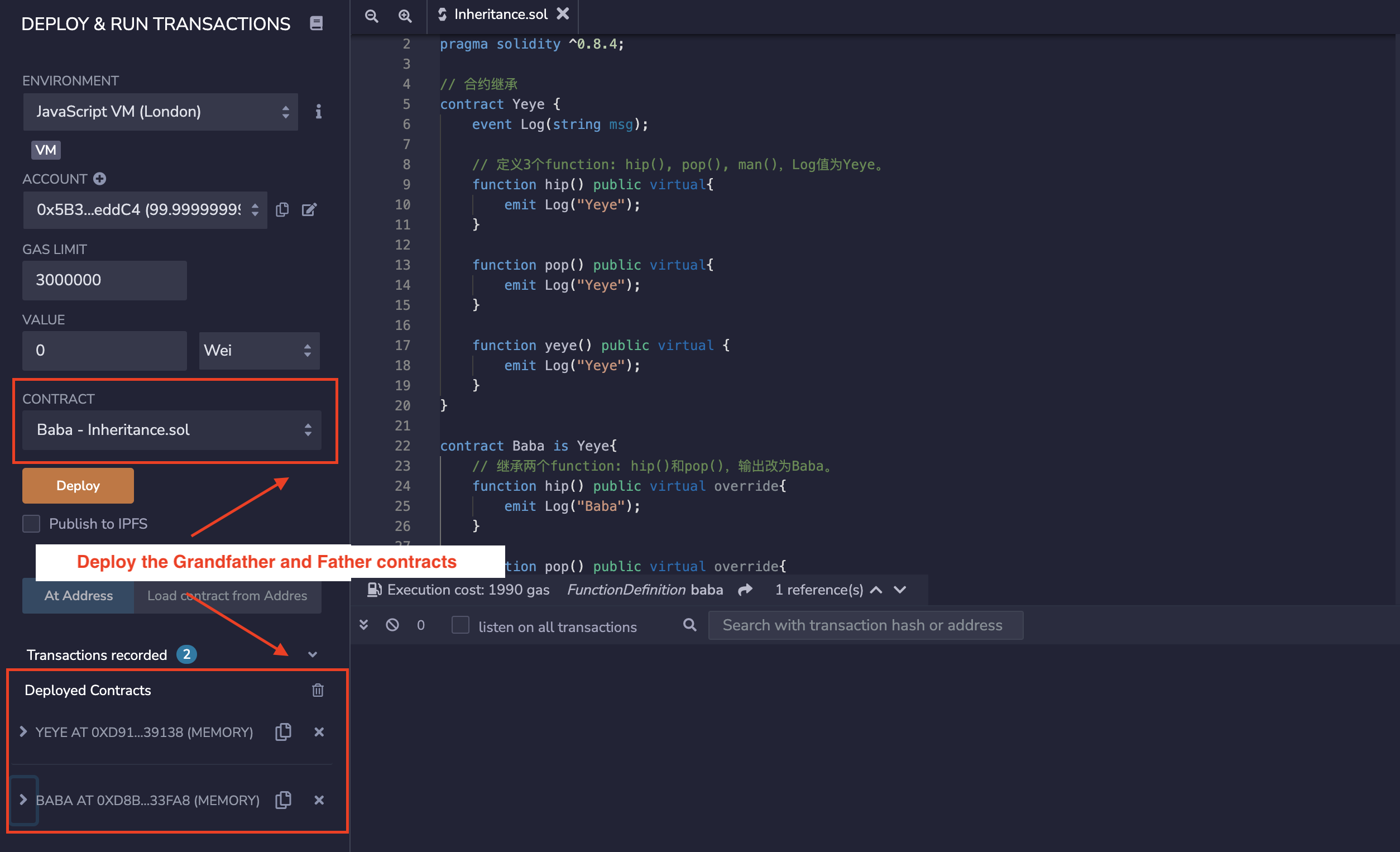
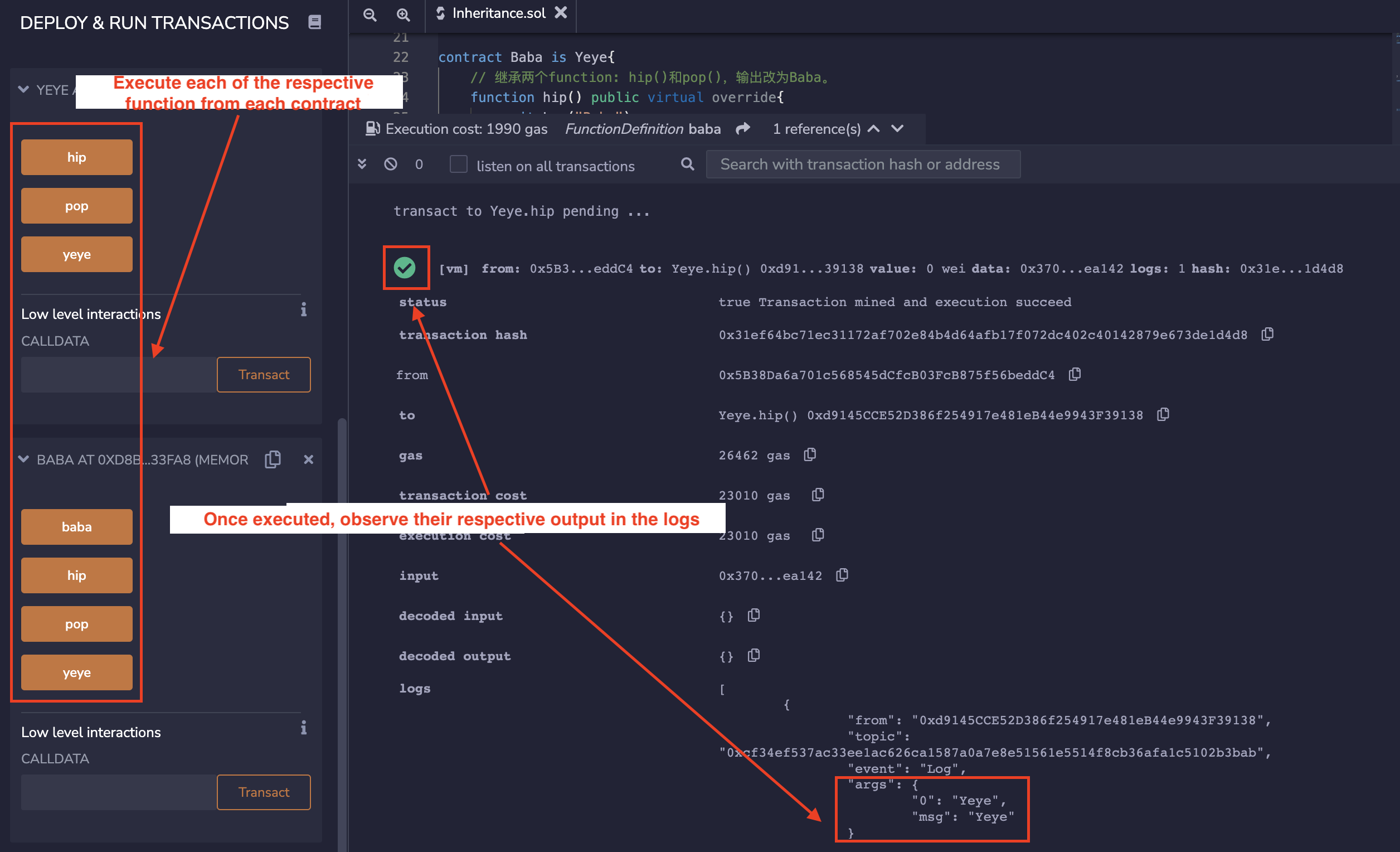
Modifier inheritance examples:
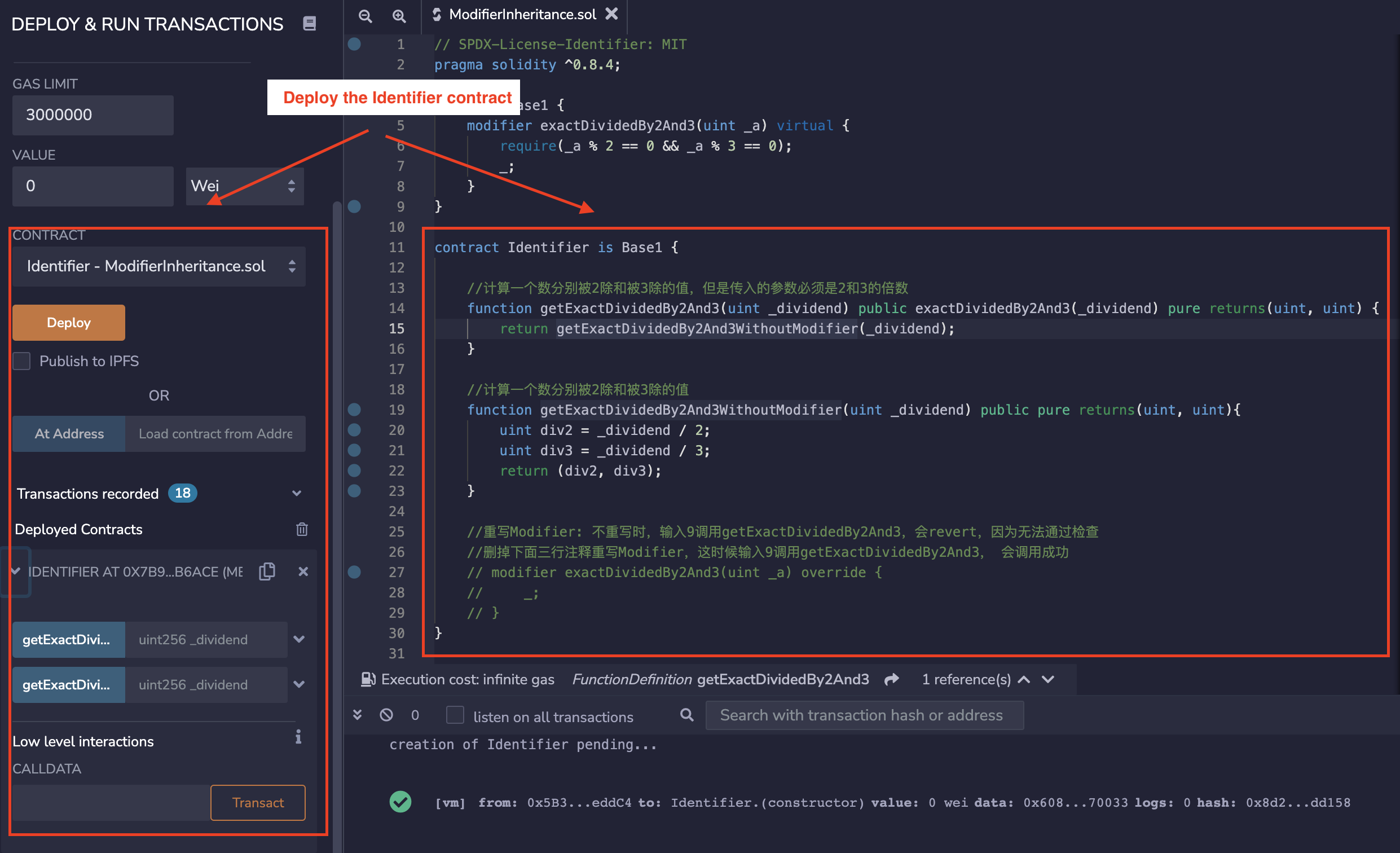
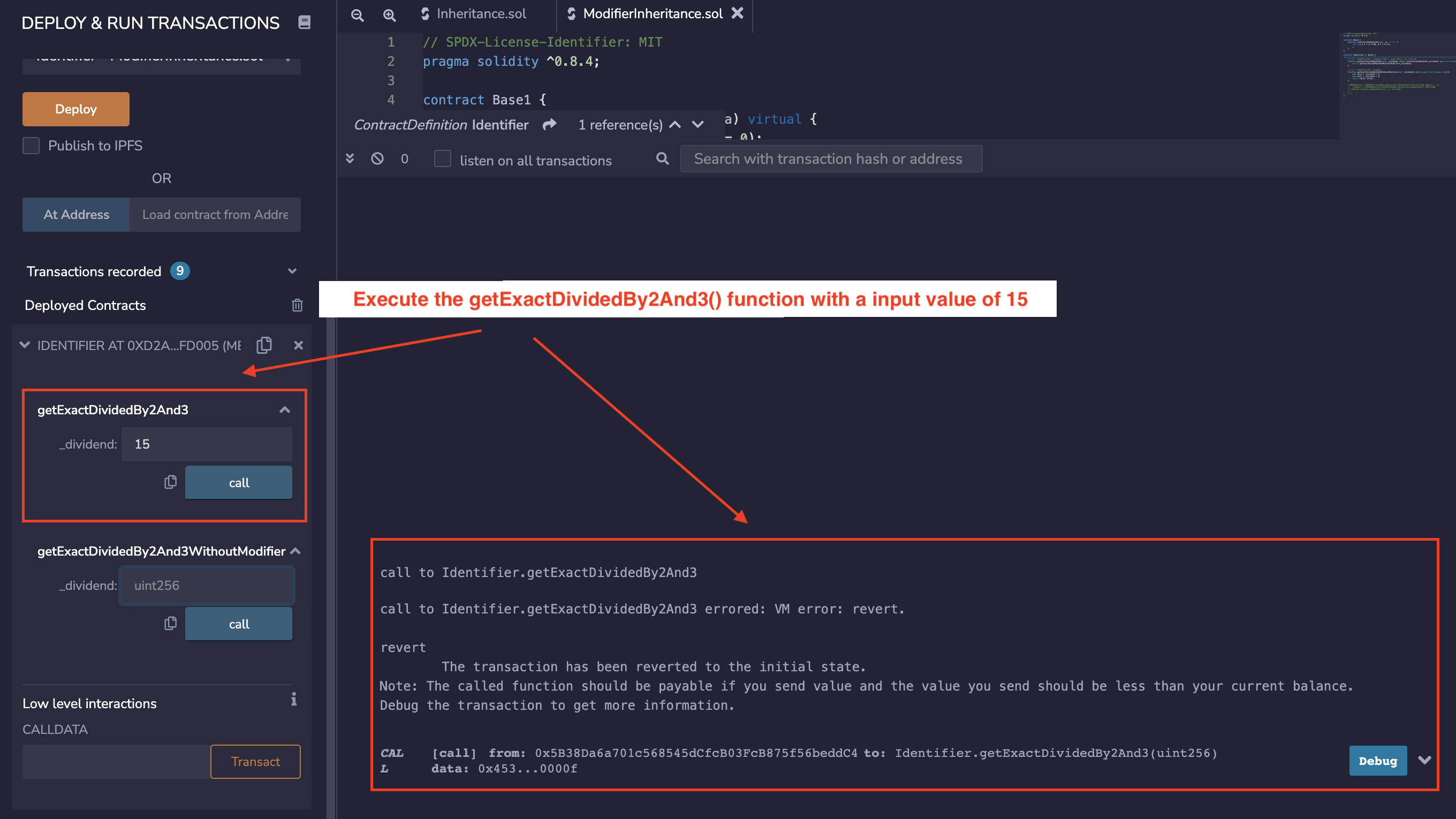
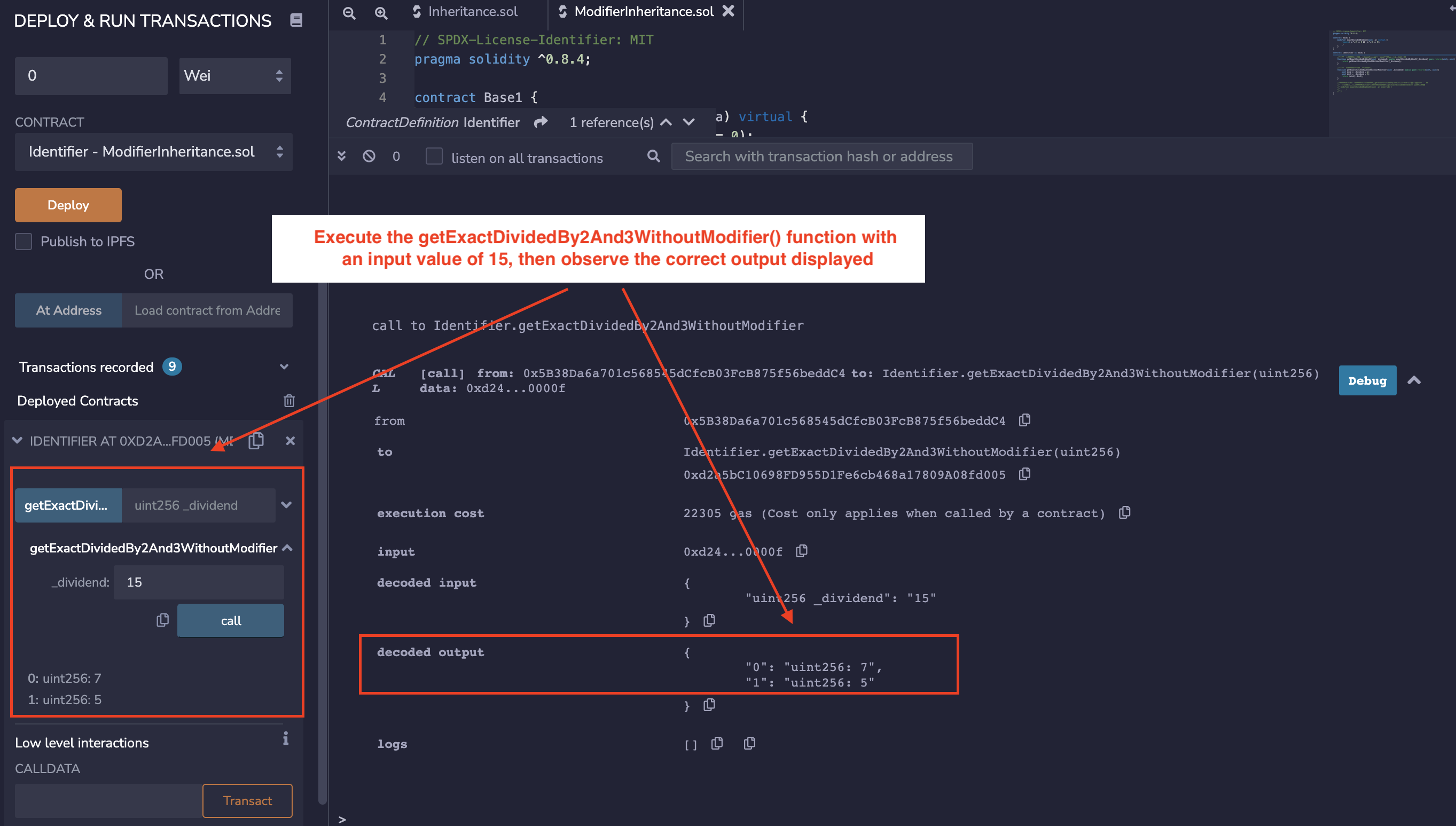
Inheritance of constructors:
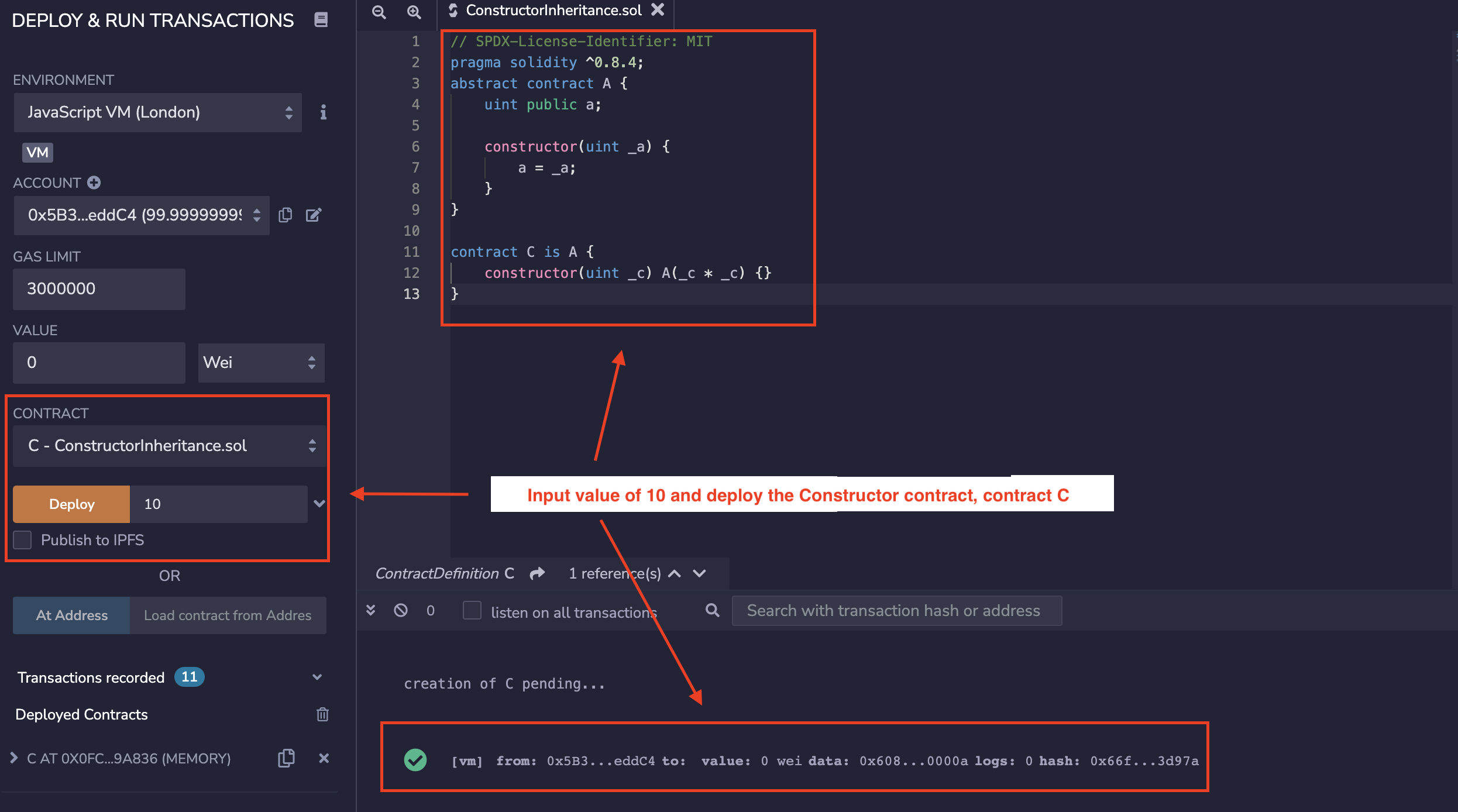
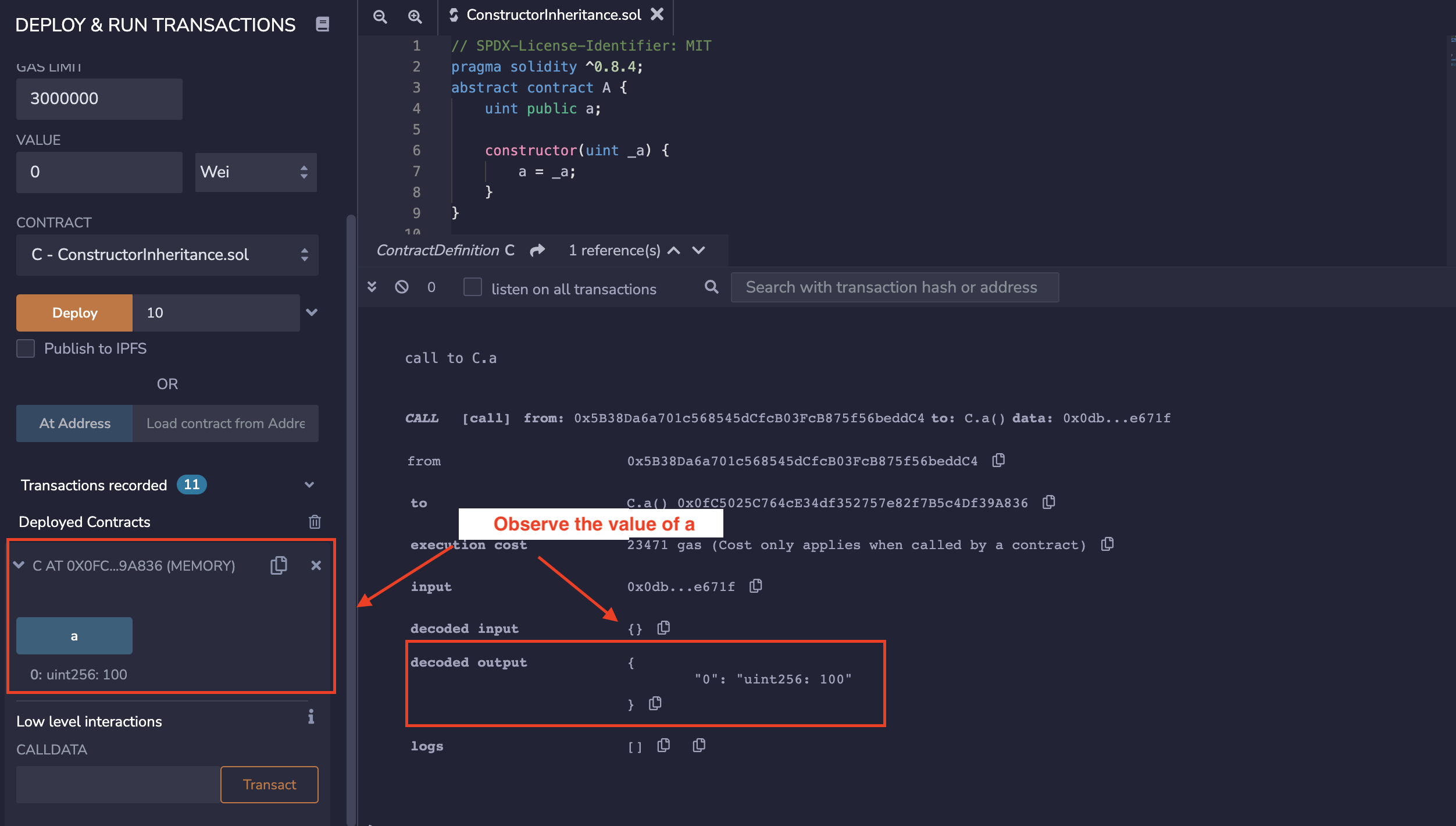
Calling the functions from parent contracts:
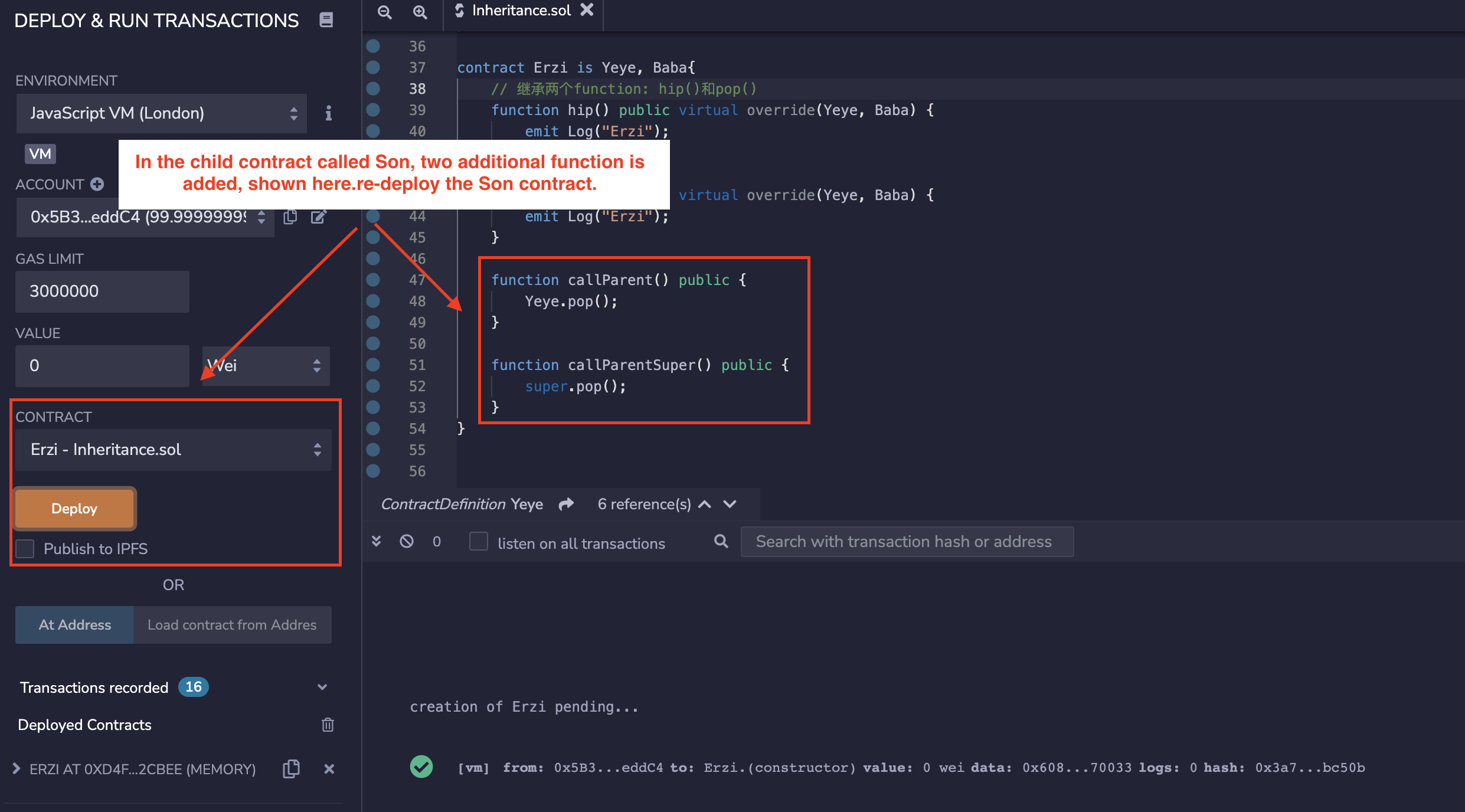
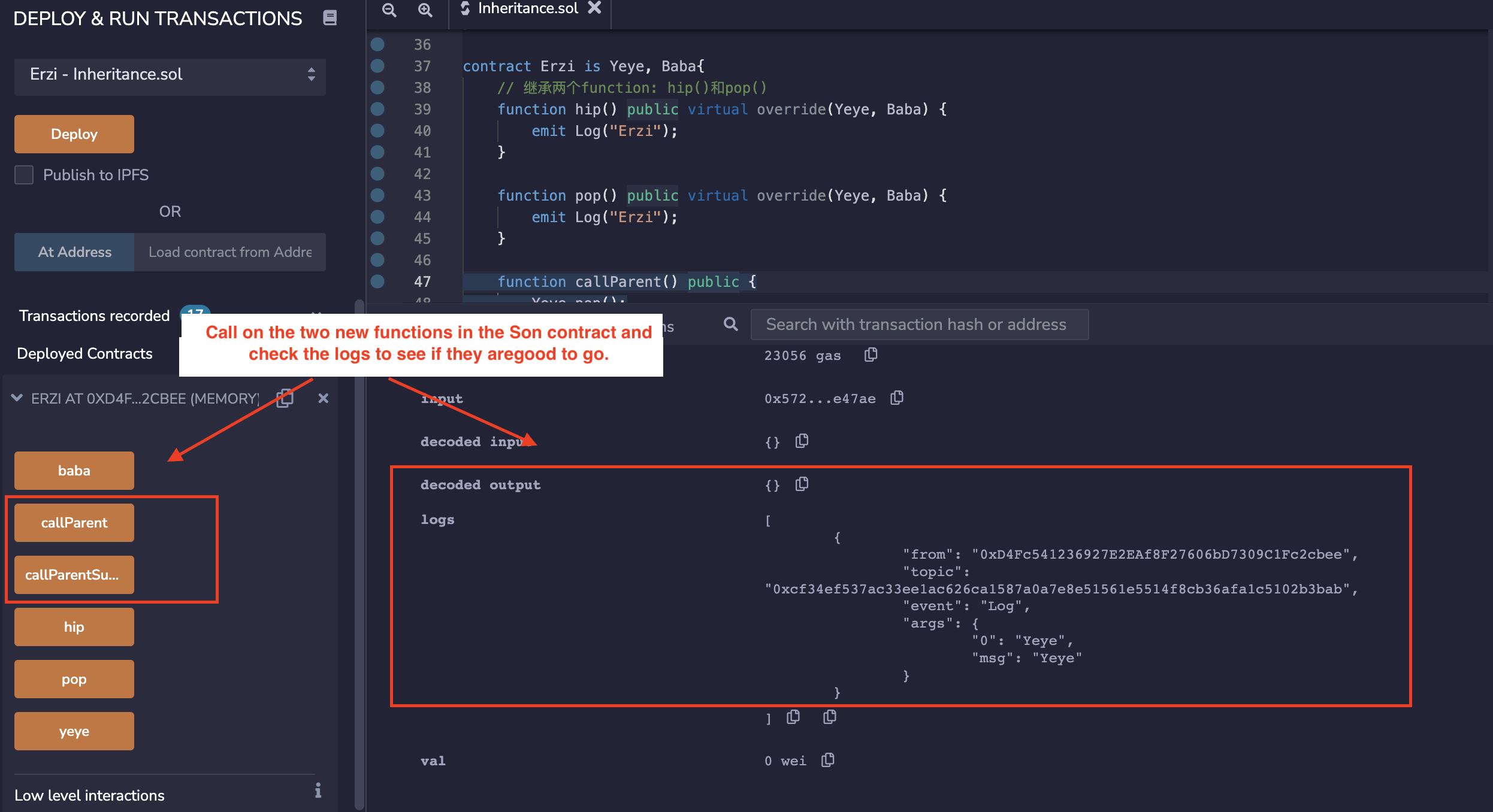
Diamond inheritance:
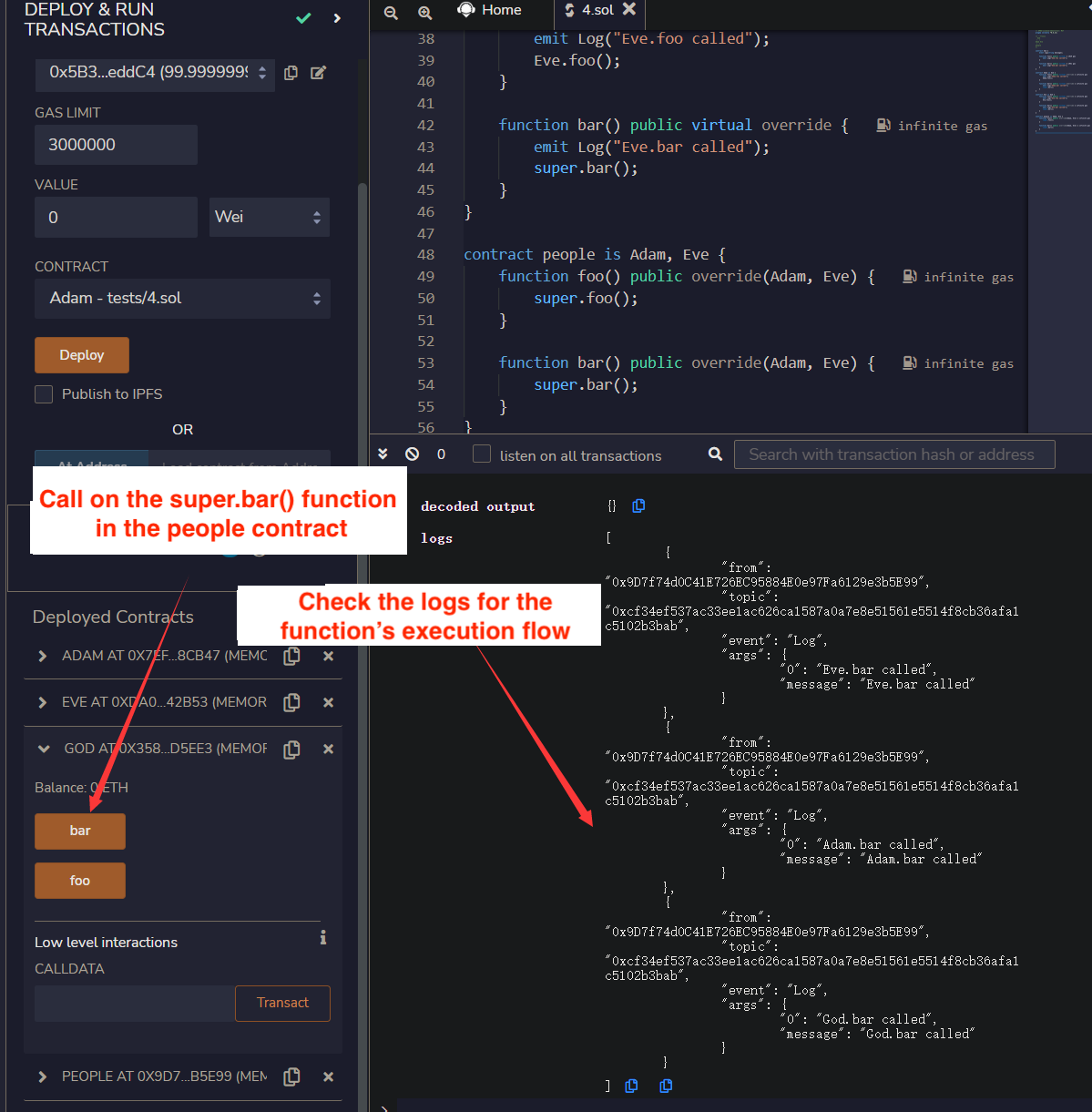
Summary
In this tutorial, we introduced the basic uses of inheritance in Solidity, including simple inheritance, multiple inheritance, inheritance of modifiers and constructors, and calling functions from parent contracts.